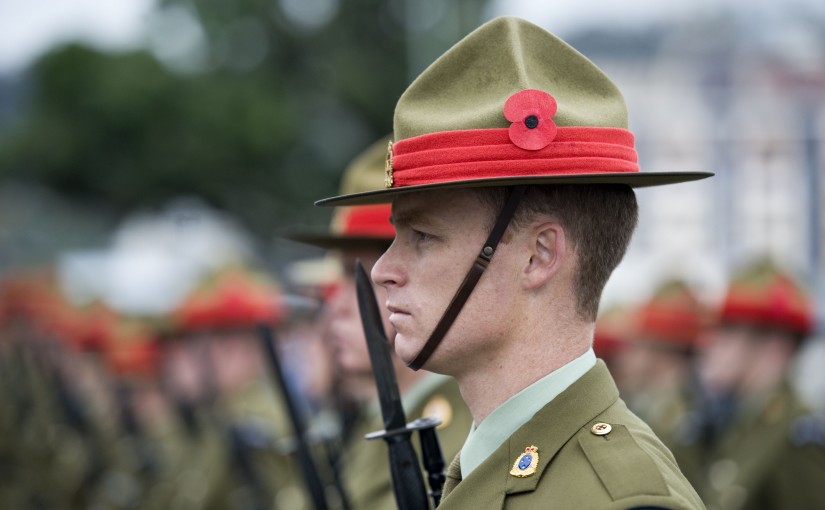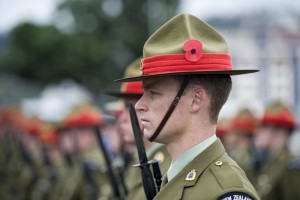Precisely one hundred years ago, somewhere in the region of ten thousand New Zealanders left their home to fight against the Ottoman Empire in Gallipoli, part of a distant eastern front in the First World War. 2,779 of those New Zealanders never returned. You’re almost definitely aware of this story; the centennial of the Gallipoli Campaign has given Wellington a proliferation of poppies, parades, and Pukeahu — the new National War Memorial right next door to our school. The story of Gallipoli is being told everywhere right now, but could the pervasiveness of the current ‘Anzac Legend’ be blinding us to the other, more overlooked stories?
For example, there’s the story of more than one hundred New Zealand military personnel who, a century after the disastrous Gallipoli Landings, find themselves stationed in the Middle East, embroiled in a distant and often convoluted conflict. Also less known is the story of a devastating thirty-five year period of conflict in New Zealand’s history, one that irrevocably shaped our nation’s political landscape, one that killed nine times as many New Zealanders as those who died in Gallipoli. Haven’t heard much about the Musket Wars? You certainly aren’t alone.
Narrative and counter-narrative swirl around in the heads of anyone who tries to examine the role of our country’s military, both past and present. While we wonder what images should be evoked by the powerful, almost mythical connotations of the words ‘Anzac’ and ‘Gallipoli’, for the past decade or so New Zealand has had to ask itself tough questions about a new conflict for a new century; not Britain calling on an Imperial Dominion to send men to the shores of Turkey, but America calling on the world to send men and women to the bloodstained deserts of Iraq. Now in 2015, as the Centennial of the Gallipoli Campaign is commemorated and the threat of ISIS sends New Zealanders once again to war, we find ourselves in a perfect moment to gauge the Wellington High School view of these happenings.
To start with, I went to Ms Jean-Louis’ Year Nine roopu class to ask how they feel about the celebrations. I arrived there on the first Thursday after Anzac Day and asked them for a brief show of hands. Out of the class of roughly twenty-five, fourteen did an activity related to Anzac Day on the day (a third of them said this activity was simply eating an Anzac biscuit). Fourteen students also said they were aware of the Prime Minister’s decision to send troops to Iraq. Asking for their opinions, however, produced a much less decisive result. Who thinks the decision to send troops is a bad one? Four hands. Who thinks it’s a good one? A solitary hand is raised. Who has absolutely no idea? The remaining nine. So, a middling amount of awareness, combined with little-to-no strong feelings.
One Year Nine Class is hardly representative of the entire school, however. I also spoke to two Year Thirteen student leaders: Debating Society President Jack Comer-Hudson, and High-Fi Radio host Kasey McDonnell.
Here’s where we begin to see some disagreement over how the commemorations are received. McDonnell argued in favour of the Centenary’s tone, saying ‘I think it’s positive in a way that they are commemorating the dead, remembering the dead, and doing that in a way that is positive for society and our ways of grieving those were involved in wars.’
Jack Comer-Hudson, however, took a stance that was much more critical of this year’s celebrations. Comer-Hudson stated he agreed with the idea of Anzac Day in general but spoke very strongly against this year’s handling of the event. ‘I feel that the way in which we [currently] commemorate Anzac day glorifies war,’ he said, ‘It gives us an unrealistic view of what it was actually like to be there. I was at the Dawn Service at Pukeahu this year, and there were a lot words used like “Valour”, “Honour”, “Duty”, “Courage”, words that I feel don’t really have a place in something like a commemoration of World War One. Because in my opinion there was really no honour or valour at all, it was a whole bunch of young men who were forced to go overseas and got brutally murdered essentially for nothing.’
It’s certainly a damning accusation. The purpose of Anzac Day is generally considered to be a day of solemn remembrance and mourning the loss of the thousands who died in the World Wars. For it to be accused by some of now spreading a pro-war message would be a dramatic and unwanted change in the tone of the holiday. I asked Kasey McDonnell if he believed the day had become more about honouring soldiers than mourning loss. ‘I would say that honouring soldiers is definitely a big part, but I wouldn’t say that it’s more honouring the soldiers than remembering the loss. We are celebrating the fact that they did serve. And that is a form of honouring them, but I don’t think it’s necessarily the major part of the Anzac commemorations; it’s more about remembering what had happened rather than celebrating it.’
Interestingly, despite their varying views on the commemorations the two did find some common ground. Four days before Anzac Day, 143 New Zealand soldiers left the country for Iraq, where they would participate in a troop-training mission alongside Australian and Iraqi soldiers. The Prime Minister has prompted controversy due to his alleged lack of transparency surrounding the deployment, alongside greater questions of if New Zealand really has a place in the conflict. Both Comer-Hudson and McDonnell believed there was a connection between the size and scope of this year’s celebrations, and the decision to send troops.
‘The Prime Minister and a lot of the country believe that what we’re doing [sending troops to Iraq] is in some way honourable, something to be proud of. I think that’s because we portray war as something that is honourable’, explained Jack. Kasey believed that the fact that it was the hundredth anniversary guaranteed a larger than usual event, but also stated ‘I think it [Anzac Day] was made use of by the Prime Minister’.
If true, we’ve seen a holiday originally dedicated to mourning the tragic losses of war become used as a method to justify a war to the people of New Zealand. That’s certainly quite a leap, so I spoke to Deputy-Principal and history teacher Andrew Savage to find out a bit about how Anzac Day has changed, and how we collectively look at New Zealand’s wartime past.
From Mr Savage’s view, Anzac Day has certainly come a long way in his lifetime. When he grew up in the late 1970s, which he described as the height of New Zealand’s ‘Protest Movement’, Anzac Day was very much centred on the tragedy and horror or war. Valour and honour didn’t enter into the vocabulary. Following a long period in which Anzac Day was really ‘not on the calendar at all’, he noted a strong resurgence occur as recently as the past five to ten years.
He has a theory why, too. He explained that it might be ‘because the veterans have actually died; there’s no more surviving World War One veterans for instance; World War Two veterans are getting older, and as we lose those characters, those other voices, they become less prominent and we want to commemorate those people and remember them in a different way.’
It’s a challenge we need to face. As the World Wars sink ever more distantly into the past, we risk seeing events become distorted and mythologised. War is and always has been a controversial issue, but as the First World War becomes linked to New Zealand’s national identity, we can see the distortions in how it’s perceived. ‘My biggest fear about the Anzac legend is that it becomes so homogenous and so cohesive that it loses any connection to the real world,’ Mr Savage said.
The mythologising of Gallipoli has affected us in more ways than one. It’s altered the way we look at and commemorate wars, it’s potentially justified us going to war, but it’s also changed the way we look at New Zealand’s history. The amount of attention given to the Anzacs and the Gallipoli Campaign have led to it being defined as ‘the moment’, the crucial event in our history, sometimes described as when New Zealand finally ‘came of age’ as a nation. Mr Savage argued against the singular focus of Anzac Day and what it’s doing to the way we look at our country’s history.
‘There’s a whole history of conflict and tragedy in New Zealand’s history that needs to be commemorated,’ he said. ‘The Musket Wars, why isn’t that part of our story of commemorating conflict and sacrifice? More New Zealanders died in the Musket Wars than have died in any other conflict that New Zealand’s been involved in, even World War One. That’s something we put under the carpet. It’s like a war that “doesn’t count”, and I think that’s profoundly sad.’
‘Lest We Forget’ is the phrase so often invoked at military commemorations. Lest we forget their battle. Lest we forget their sacrifice. More recently, lest we forget their honour. But we’re in no danger of forgetting anymore. Gallipoli has cemented its place in New Zealand’s identity; it fills the same role as Gettysburg in the United States, Agincourt or Waterloo in Britain, the Deluge in Poland. As Gallipoli fades from personal memory and moves into history that’s remembered only second-hand, we don’t risk forgetting, but misremembering. It’s easier and less painful to remember the bravery and honour, but we owe it to the soldiers of New Zealand’s past to remember the pain, the inhumanity, the atrocity. We owe it not only to them, but to the citizen of New Zealand, both now and tomorrow. To let a commemoration of the tragedies of war become a congratulation of soldiers and a justification for war is the greatest tragedy of all. On April 25th, 2015, we observed one century since the Gallipoli Landings. Now we must ensure we remember the events properly. Not as a myth, but as a battle, one of many bloody, brutal, often unnecessary battles in New Zealand’s history. Lest we forget the truth of war.
Written By Taran M


